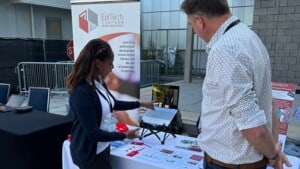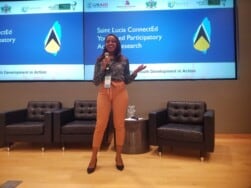Digital Solutions for Increasing Access to STEM Education
September 25th, 2023 | Blogs
Science, technology, engineering, and math (STEM) education equips young people with crucial skills and builds future leaders and problem solvers. To improve access to STEM education around the world, experts are using existing and new tech and non-tech solutions.
World Education staff joined these experts at the first global STEM education event, the mEducation Alliance Symposium, held September 11 – 14 We shared our learned experiences in implementing EdTech and STEM education programs in the US, the Caribbean, Sub Saharan Africa, and the Middle East.

Our experts explored how online learning platforms and mobile apps can improve English language skills of students and teachers, and why both students and teachers should be included in education program design and learning resource creation. “Look at existing, free learning management systems (e.g., Google Classroom) to develop your digital continuous professional development model,” said Willem van de Waal, senior technical advisor at World Education. This way, sustainability and accessibility are furthered compared to developing new platforms that are costly to adopt.
World Education is also increasing awareness and strategic use of open education resources (OER) to make learning more accessible through our CrowdEd Learning initiative. “Just having open content available is not enough,” explained Jeff Goumas, senior technical advisor at World Education. “Meaningful, sustained use of OER requires a comprehensive strategy with clear standards and frameworks to align resources.” Well-organized platforms designed to host them and adequate training for teachers should then follow.
And while technology can help learning, “the meaningful integration of technology in the teaching and learning process is still an experimental activity in some educational landscapes,” says Gilda Marcion, technical advisor at World Education. It’s important to consider digital skill levels and learning needs to ensure the technology is appropriate. The Saint Lucia ConnectEd Activity, for example, is discovering best practices through youth-led research studies that allow youth to build skills while guiding the direction of EdTech interventions.

In connecting with other Symposium attendees, we identified opportunities to apply our tech and non-tech approaches to increase STEM education access and leverage existing and emerging digital tools to fill resource gaps. The event provided countless examples of how STEM education is preparing learners for the future, inspiring curiosity, enhancing workforces, and tackling real-world problems.
“Access to quality STEM education and digital learning resources continues to be a challenge for many,” said Jeff. “It was encouraging to see a wide range of low-and even no-tech solutions shared that can be used to teach foundational digital skills.”
World Education fosters enduring partnerships across regions and sectors to advance education outcomes for all. We offer education systems strengthening, program design and implementation, applied research and evaluation, capacity development, and policy development services.